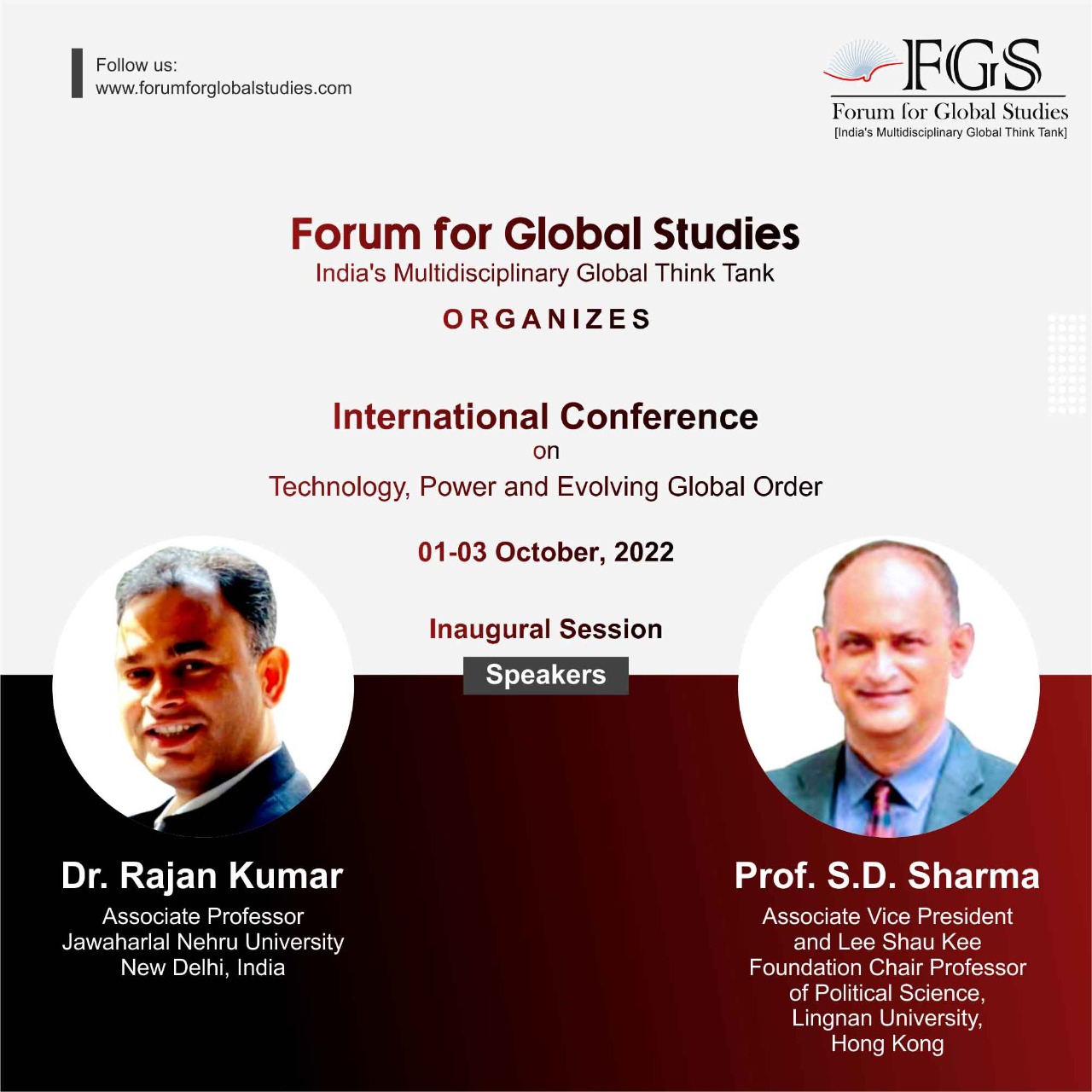Day 1
Event Report
Technology, Power, and Evolving Global Order
Inaugural Session
On 1st September 2022, the Forum for Global Studies, New Delhi, a multidisciplinary global think tank, hosted the inaugural session of a three-day international conference on “Technology, Power and the Evolving Global Order”. Ms. Vaishanvi Singh, Law Student at Institute of Legal Studies and Research, GLA University, Mathura and Dr. Sandeep Tripathi, President and Founder, Forum for Global Studies, New Delhi, welcomed the guest speakers and all the participants.
Dr. Rajan Kumar, Associate Professor, Jawaharlal Nehru University, New Delhi, India thanked FGS for inviting him to share his valuable thoughts in the conference. According to him, technology and control over the resources play a crucial role in the formation of a superpower. Historically, the superiority of empires like the Mauryan Empire relies much upon technological advancement. In the contemporary world, the USA and China are competing on the basis for technological supremacy. The USA is trying to assert the status quo by incepting technological nationalism through the Chips and Science act. China is gaining technological advantage by enlarging its presence in higher technology, AI and semiconductors. He feels that the dominance of the west is attributed to the industrial revolution as the west was able to acquire gain over technology even though resources were absent. He concludes by saying that the contemporary global order is fragmenting, and the world is becoming multi-polar with the strengthening of fierce rivalry with the USA. Also, regional powers will play a crucial role in global politics.
Dr. Sandeep Tripathi invited Prof. Shalendra D. Sharma, Associate Vice President and Lee Sahu Kee Foundation Chair Professor of Political Science, Lingnan University, Hong Kong to share his insights on the theme Prof. Sharma expressed concerns regarding the collapsing liberal global order that had been in effect since the aftermath of the second world war. He starts by quoting Gramsci that the old is dying and the new is yet to be reborn. The USA, the chief defender of the liberal global order has failed mainly because of the asymmetrical globalization and the eroding domestic political economy. The middle class has collapsed and there has been a huge disparity between the rich and the poor. The collapse of liberal global order can also be attributed to the failure of the belief that economic integration will create economic interdependence and will lead to formation of democratic governments. China can be a best example of how they practiced economic globalization and eventually turned into an authoritarian state. He points to the trends of the evolving order. According to him, there are different viewpoints to the possible emergence of the global order. As per the optimistic view, the liberal global order will become balanced if the USA imposes its authority at the multilateral stage. The pessimistic view says that the Liberal order will collapse as it is incompatible with authoritarianism. He concludes by pointing to the fact that the weak domestic governance in India needs to be addressed.
Dr. Tripathi invited Ambassador J. K. Tripathi, Former Consul General of India in São Paulo (Brazil) & Ambassador of India to Zimbabwe to share his views on the topic. Ambassador Tripathi started by painting the importance of technology in the global world order in the past as well as the present times. He says that the fight for supremacy has become intense in the current global order. The acquisition and position of critical technologies by China like semiconductors has played a crucial role in the ongoing rift. He further points to the concerns in the uncertain global order. According to him, contemporary warfare is not only in terms of military but cybersecurity warfare with increasing importance of information technology has gained the utmost attention. The future of the global order will be determined by the regional organizations. The ongoing war is a win-win situation for both China and India. He feels that China gains most despite the result of the ongoing clash. He concludes by saying that India must not escalate its border conflicts with China into war and continue the de-hyphenation foreign policy approach.
Further, Dr. Tripathi invited Dr. Ivan Danilin, Head of Department, Department of Science and Innovation, The Institute of World Economy and International Relations (IMEMO). Dr. Danilin shared his insights on the topic ‘Science, Technology and geo-politics.’ He says that global science, technology and economy is internationalized with various uneven factors playing a role in it. He emphasized upon the importance of the digital economy and the inception of new concepts like unicorns which had been unpopular till the recent times. He points to the emergence of developing countries in the technology realm. According to him, science efficiency has slowed in developed countries because of lack of capital. He states that geo-political challenges are emerging because of the global competition, supply chain, digital economy and consequences of technology in the global world. He states that the securitization of technological development coincides with the geo-political trends leading to conflicts in the international arena. He expresses optimism in his insights that the future will incorporate the role of international institutions, global governance and economic reforms to address the common global challenges of the contemporary world. He cautioned against the attitude of great powers trying to politicize technology and science to achieve their political as well as economic targets. Also, he points to the fact that markets are turning into battlefields. He concludes by stating that human capital is key to future development rather than work.
With that, Ms. Vaishanvi Singh, thanked the guests for delivering their insights in the inaugural session of the crucial assessment which is crucial for all stakeholders associated with the field of international relations and global studies.

